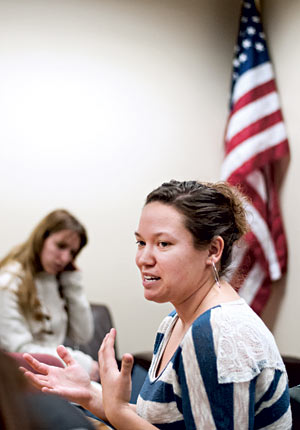Barely a few years removed from serving as an officer in the U.S. Coast Guard, Robert Daniels was an alcoholic living in the streets.
In his late 40s and without a college education, he tried working construction, but the constant wear and tear beat up a body that had already toiled under years of intense search and rescue missions and military training. He became injured, demoralized and, like hundreds of thousands of other American veterans, unemployed.
“When I came out of the service I was pretty lost,” he says. “When you get home, that camaraderie is gone. I started to drink. That didn’t work. Eventually that road led me to the streets.”
Daniels spent five years off and on subsisting on the crumbs of life and sleeping wherever he found shelter.
“I just didn’t know what to do,” he says.
An organization devoted to helping veterans in Boise found Daniels and encouraged him to undergo alcohol treatment and develop ways to deal with situations and adversity without turning to drugs and alcohol or suicide, a prevailing tragedy that plagues veterans.
He stuck with the program for two years and it was during this turnaround that the idea came up to go back to school.
Daniels grew up in Great Falls, but the Flathead held a special place in his mind. Just over two years ago, he arrived with a tent, a sleeping bag and a class schedule for Flathead Valley Community College. He set up camp along Whitefish Lake and stayed there for nearly a month, living under a tarp in the rain, while he began attending FVCC. He became a frequent presence in the computer lab or library, or staying after class to ask his teachers questions.
“I was determined to be successful,” he says. “I had a lot of questions, but I never got turned away. Even students I asked for help at the library helped me. The more that I got into the school, the opportunities just opened. It gave me back a sense of my own empowerment. I have hope. I don’t have to sit there waiting for a check once a month. I’m not going to do that. There’s still a lot more to live.”
He now commutes from Thompson Falls almost every day, taking five classes at FVCC and entering the final semester of a degree in social work. His goal after graduating is to help people with substance abuse and addiction therapy, to offer a helping hand like the one he once was given.
Looking at his life today, the 55-year-old is quick to give credit to those who helped him, especially FVCC and its new Veterans’ Center.
In August, the community college established a new setting specifically designed for veterans. It’s centrally located on campus in a room formally used by the paramedicine department, and features computers, tables and a small kitchen area. The center provides access to resources, including counseling services, as well as a support officer to help with financial aid benefits or questions about employment, housing and more. The new center also offers students a place to study and interact with fellow veterans.
“Once you get out of the military you lose that bond and that camaraderie, so it’s nice to have a place where like-minded people can come together,” says Amber Granzow, a 28-year-old student at FVCC who served for five years in the U.S. Air Force and remains active in the National Guard.
The new center was created after President Jane Karas focused efforts on helping veterans on campus and began asking faculty how FVCC could improve its abilities.
 |
|
U.S. Air Force veteran Amber Granzow discusses benefits of the Veterans Center at Flathead Valley Community College on Jan. 21. – Greg Lindstrom | Flathead Beacon |
Last semester there were 143 students with veteran benefits attending FVCC, including 120 veterans. An estimated 2.5 million men and women are expected to return home from military service across the U.S. in the coming years.
“Veterans are one of the highest populations of unemployed when they first come home because their jobs have been taken over by somebody else while they were gone,” says Sherry Taylor, the officer at FVCC’s Veterans’ Center and a financial aid specialist. “So most people don’t just come home and instantly have a job. So if they can’t find a job, lots of times going to school they can get some extra training so they’re more qualified for a job. It can be a nice transition for them.”
The new center was created using a $30,000 grant from the state’s Office of the Commissioner of Higher Education.
Taylor works with anyone who needs help navigating the transition from military service to civilian life, not just those who are students at FVCC. She commonly hears amazing stories, like Daniels’.
“I get to spend so much time with the students now and so I get to know them a lot better now,” she says. “Especially students like Rob, hearing his story and what he’s gone through and where he’s at now. He’s a straight A student. He just tells me all the time how much he appreciates having the Veterans’ Center here.”
A group of veteran students, including Daniels and Granzow, based in the new center is rallying funds for future scholarships and community events involving veterans.
For more information, contact Sherry Taylor at 406-756-3982 or [email protected].
FVCC is hosting a public informational session tailored to veterans on Feb. 13 at the Arts and Technology Building, from 8:30-11:30 a.m. The session will feature Dr. Peter Schmidt, a licensed mental health counselor, and a workshop featuring an overview of the cultural transition and resources available to veterans.